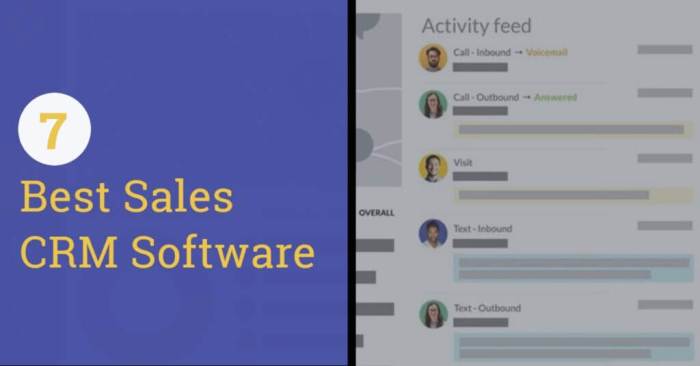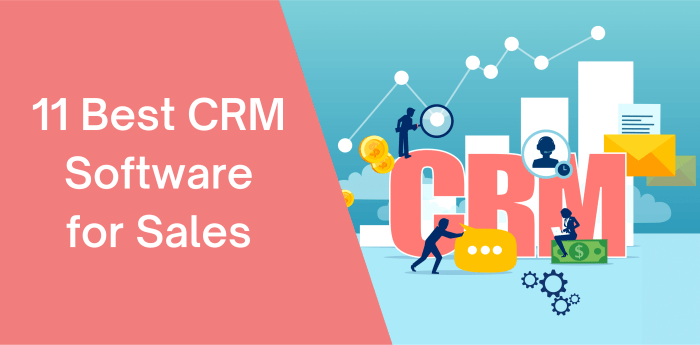Crm software for sales and marketing – In today’s competitive business landscape, effective customer relationship management (CRM) is no longer a luxury but a necessity. A robust CRM system empowers sales and marketing teams to streamline processes, improve customer interactions, and ultimately drive revenue growth. This comprehensive guide delves into the world of CRM software, exploring its features, benefits, and how it can revolutionize your sales and marketing strategies.
Understanding CRM Software: More Than Just a Contact List
CRM software goes far beyond simply storing contact information. It’s a centralized hub for managing all customer interactions, from initial lead generation to post-sale support. Modern CRM systems leverage data analytics to provide valuable insights, enabling businesses to personalize their approach and optimize their strategies. This allows for a more efficient and effective approach to customer engagement, leading to improved customer satisfaction and increased profitability.
Key Features of Effective CRM Software
- Contact Management: Centralized storage and organization of customer data, including contact details, purchase history, and interaction logs.
- Lead Management: Tracking leads from initial contact to conversion, automating follow-up processes, and prioritizing high-potential prospects. This often involves lead scoring and lead nurturing functionalities.
- Sales Force Automation (SFA): Automating repetitive tasks such as scheduling appointments, sending emails, and managing sales pipelines, freeing up sales representatives to focus on building relationships.
- Marketing Automation: Automating marketing campaigns, personalizing email marketing, and tracking campaign performance. This often integrates with email marketing platforms and marketing analytics tools.
- Customer Service & Support: Managing customer inquiries, resolving issues, and tracking customer satisfaction through various channels like email, phone, and chat. Ticketing systems are often integrated.
- Reporting & Analytics: Generating reports on key metrics, such as sales performance, marketing ROI, and customer satisfaction, to identify areas for improvement and inform strategic decisions. Dashboards provide real-time insights.
- Integration Capabilities: Seamless integration with other business applications, such as email marketing platforms, e-commerce platforms, and accounting software. This ensures data consistency and workflow efficiency.
Benefits of Implementing a CRM System
Investing in a CRM system offers a multitude of benefits for both sales and marketing teams:
- Improved Sales Productivity: Automating tasks and providing sales representatives with the information they need to close deals faster.
- Enhanced Customer Relationships: Personalized interactions and improved customer service lead to increased customer loyalty and advocacy.
- Increased Revenue: Improved sales efficiency and customer retention directly translate to higher revenue generation.
- Better Marketing ROI: Tracking marketing campaign performance and optimizing strategies based on data-driven insights.
- Improved Team Collaboration: Centralized access to customer data and communication tools improve team collaboration and efficiency.
- Data-Driven Decision Making: Access to real-time data and analytics allows for informed decision-making across all departments.
- Scalability and Flexibility: CRM systems can adapt to the changing needs of a growing business.
Choosing the Right CRM Software for Your Business
Selecting the right CRM system requires careful consideration of your business needs and budget. Factors to consider include:

Source: spotio.com
- Business Size and Industry: Different CRMs cater to businesses of different sizes and industries.
- Budget: CRM software pricing varies widely, from affordable cloud-based options to expensive enterprise solutions.
- Features and Functionality: Prioritize the features that are most important to your business.
- Integration Capabilities: Ensure the CRM integrates seamlessly with your existing business applications.
- User-Friendliness: Choose a CRM that is easy for your team to learn and use.
- Scalability: Select a CRM that can grow with your business.
- Customer Support: Look for a vendor that provides excellent customer support and training.
Types of CRM Software
CRM software comes in various forms, each with its own strengths and weaknesses:
Operational CRM
Focuses on streamlining business processes, improving efficiency, and automating tasks. This includes sales force automation (SFA), marketing automation, and customer service automation.
Analytical CRM, Crm software for sales and marketing
Uses data analysis to gain insights into customer behavior, preferences, and trends. This helps in developing targeted marketing campaigns and improving customer service.
Collaborative CRM
Facilitates communication and collaboration between different departments and teams, ensuring a unified customer experience.
Popular CRM Software Options
The market offers a wide range of CRM solutions, catering to various business sizes and needs. Some popular options include Salesforce, HubSpot, Zoho CRM, Microsoft Dynamics 365, and Pipedrive. Each platform offers unique features and pricing models, making it crucial to research and compare before making a decision. Consider factors such as ease of use, integration capabilities, and scalability when making your choice.
Implementing and Managing Your CRM System
Successful CRM implementation requires careful planning and execution. This includes:
- Data Migration: Accurately transferring existing customer data to the new CRM system.
- User Training: Providing adequate training to your team on how to use the CRM effectively.
- Process Optimization: Adapting your business processes to leverage the capabilities of the CRM system.
- Ongoing Monitoring and Maintenance: Regularly monitoring the CRM’s performance and making necessary adjustments.
Frequently Asked Questions (FAQ)
- Q: What is the cost of CRM software? A: The cost varies greatly depending on the vendor, features, and number of users. Some offer affordable monthly subscriptions, while others have higher upfront costs.
- Q: How long does it take to implement a CRM system? A: Implementation time depends on the complexity of the system and the size of your business. It can range from a few weeks to several months.
- Q: What are the key metrics to track with a CRM? A: Key metrics include lead conversion rates, customer acquisition cost, customer lifetime value, and customer satisfaction scores.
- Q: Can a small business benefit from a CRM? A: Absolutely! Even small businesses can benefit from improved organization, communication, and customer engagement offered by a CRM.
- Q: How do I choose between cloud-based and on-premise CRM? A: Cloud-based CRMs are generally more affordable and accessible, while on-premise solutions offer greater control but require more IT infrastructure.
Conclusion
Investing in a robust CRM system is a strategic move that can significantly impact your business’s growth and profitability. By streamlining processes, improving customer interactions, and providing data-driven insights, a CRM empowers sales and marketing teams to achieve their goals more effectively. Choosing the right CRM requires careful consideration of your specific needs and a commitment to ongoing optimization.

Source: octopuscrm.io
Take the time to research your options, plan your implementation carefully, and reap the rewards of a more efficient and customer-centric business.
References: Crm Software For Sales And Marketing
Call to Action
Ready to transform your sales and marketing efforts? Explore the leading CRM solutions available today and find the perfect fit for your business. Contact us to discuss your specific needs and learn how we can help you implement a successful CRM strategy.
Frequently Asked Questions
What are the key features of a good CRM system?
Key features include contact management, lead tracking, sales pipeline management, marketing automation, reporting and analytics, and customer service tools. Integration with other business applications is also crucial.
How much does CRM software cost?
CRM software pricing varies greatly depending on the features, number of users, and vendor. Options range from free, basic plans to enterprise-level solutions with substantial monthly or annual fees.
How long does it take to implement a CRM system?
Implementation timelines depend on the complexity of the system, the size of the business, and the level of customization required. It can range from a few weeks to several months.
What are the common challenges of CRM implementation?
Common challenges include data migration issues, user adoption problems, integration complexities, and the need for ongoing training and support.
Can a small business benefit from using CRM software?

Source: bigcontacts.com
Absolutely. Even small businesses can benefit from improved organization, streamlined communication, and better customer relationships that a CRM system provides. Many vendors offer affordable solutions tailored to smaller businesses.
